Fifth Sunday of Lent
March 29, 2020 Cycle A
Purple priestly vestments symbolize penance and preparation.
Home Page
Liturgical Year Cycle
2019-2020
Introductory Acts Of Worship
The Entrance Prayers:
On Sunday, usually a hymn praising God
is sung in place of reciting a Psalm from the Bible which invites us to
enter more deeply into the mystery of God's love for us. The recited
weekday Psalm expresses a youthful heart and spirit, delighted that we may come
before the living God.
The Entrance Prayers:
On Sunday, usually a hymn praising God
is sung in place of reciting a Psalm from the Bible which invites us to
enter more deeply into the mystery of God's love for us. The recited
weekday Psalm expresses a youthful heart and spirit, delighted that we may come
before the living God.
Entrance Song
/ Entrance Psalm (Antiphon)
Entrance Song
Psalm 42:1-2
Give me justice, O
God, and plead my cause against a nation that is faithless. From the
deceitful and cunning rescue me, for you, O God, are my strength.
The Priest Approaches and Kisses the Altar:
The
altar is a symbol of Christ. In it are cut five crosses to recall the five
wounds of Christ. The altar also represents the Church and has embedded in
it the relics of her saints. The priest comes to the altar to celebrate
the Sacrifice in the Church's name. Because of the glory surrounding the
altar upon which the divine Sacrifice will be made, the kiss of the priest
unites the Church to Christ, its Redeemer.
Priest:
In the name of the Father, and of the Son, and of the Holy Spirit.
All:
Amen.
The Greeting:
We are welcomed in God's name. Our
response unites us to our neighbor, to the priest and to God. (The priest
may select from several forms of greeting).
Priest: The
Lord be with you.
All:
And with your spirit.
The Penitential Prayers:
We recognize our guilt for past sins,
express our sorrow for them, and ask that Mary, the angels, the saints, and our
brothers and sisters in Christ pray for the Lord God's mercy. (The priest
may select from several forms).
Priest: You were sent to heal the
contrite of heart: Lord, have mercy..
All: Lord, have mercy.
Priest: You came to call sinners: Christ, have mercy.
All: Christ, have mercy.
Priest: You are seated at the right hand of the father to
intercede for us: Lord, have mercy.
All: Lord, have mercy.
The Absolution:
Priest: May almighty God have mercy on us, forgive us our sins, and
bring us to everlasting life.
All: Amen.
The Collect Prayer:
The
priest lifts the united prayers and petitions of the congregation to God the
Father through the merits of Jesus Christ in the Holy Spirit.
Priest: Let
us pray. By your help, we beseech you, Lord our God, may we walk eagerly
in that same charity with which, out of love for the world, your Son handed
himself over to death. Through our Lord Jesus Christ, your Son, who lives
and reigns with you in the unity of the Holy Spirit, one God, for ever and ever.
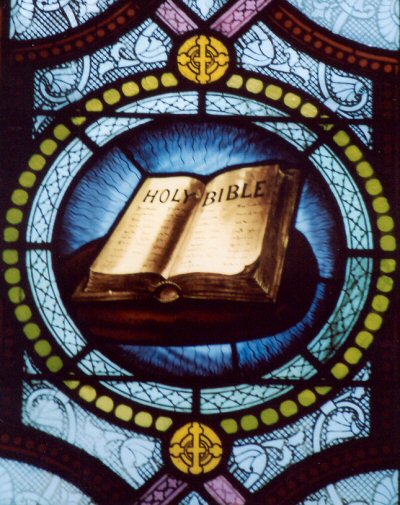
Liturgy of the Word
Christ is made known to us through the
Old Testament which prepares us to recognize Him. In those days, God
inspired men who spoke His message. Now, the New Testament Gospel reading
announces His presence to us directly through His Son. Both
readings bring God's message to us. Our responsibility is to respond.
The First Reading:
From the Old Testament
Priest/Reader: A
reading from the prophet Ezekiel.
First Reading: Ezekiel 37:12-14
Thus says the Lord God: O my people, I
will open your graves and have you rise from them, and bring you back to the
land of Israel. Then you shall know that I am the Lord, when I open your graves
and have you rise from them, O my people! I will put my spirit in you that you
may live, and I will settle you upon your land; thus you shall know that I am
the Lord. I have promised, and I will do it, says the Lord.
Priest/Reader:
The Word of the
Lord.
All:
Thanks
be to God.
The Responsorial Psalm:
This Psalm praising God, is a prayer to God,
or recommends the practice of virtue. It is sung as an interlude between
the scriptural readings. It provides yet another instructional setting and
invites the assembly to imitate the cantor who sings a repeated response to the
verses of an ancient Psalm many of which are attributed to King David. The
verses are sung first by a cantor (song leader) accompanied by instruments, the
refrain is sung by the people.
Psalm 130:1-2, 3-4, 5-6, 7-8
Cantor: With the Lord there is
mercy, and fullness of redemption.
All: R/. With the
Lord there is mercy, and fullness of redemption.
Cantor: Out of the depths I cry to you, O Lord; Lord, hear my
voice! Let your ears be attentive to my voice in supplication.
All: R/. With the
Lord there is mercy, and fullness of redemption.
Cantor: If you, O Lord, mark iniquities, Lord, who can stand?
But with you is forgiveness, that you may be revered.
All: R/. With the
Lord there is mercy, and fullness of redemption.
Cantor: I trust in the Lord; my soul trusts in his word.
More than sentinels wait for the dawn, let Israel wait for the Lord.
All: R/. With the
Lord there is mercy, and fullness of redemption.
Cantor: For with the Lord is kindness and with him is
plenteous redemption; and he will redeem Israel from all their iniquities.
All: R/. With the
Lord there is mercy, and fullness of redemption.
The Second Reading:
Taken from the New Testament, often
from a letter written by St. Paul.
Priest/Reader: A Reading
from the first letter of Saint Paul to the Romans.
Second Reading: Romans 8:8-11
Brothers and sisters:
Those who are in the flesh cannot please God. But you are not in the flesh; on
the contrary, you are in the spirit, if only the Spirit of God dwells in you.
Whoever does not have the Spirit of Christ does not belong to him. But if
Christ is in you, although the body is dead because of sin, the spirit is alive
because of righteousness. If the Spirit of the One who raised Jesus from the
dead dwells in you, the One who raised Christ from the dead will give life to
your mortal bodies also, through his Spirit dwelling in you.
The Alleluia:
An ancient expression of joy anticipating
the Lord's message we will hear in the Gospel.
John 11:25a, 26
Cantor: Praise to you, Lord Jesus Christ, king of endless
glory!
ALL: R/. Praise to you, Lord Jesus Christ, king of endless
glory!
Cantor: I am the resurrection and the life, said the Lord:
he who believes in me, even if he dies, will never die.
ALL: R/. Praise to you, Lord Jesus Christ, king of endless
glory!
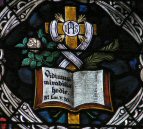 The Gospel:
The Liturgy of the Word is completed
by the reading of the Gospel. Before its reading, the members of the
assembly trace the sign of the cross upon the forehead to indicate their mental
acceptance of the Truth, on the lips to indicate their readiness to announce it,
and over the heart to indicate their sincere desire to accept it into their
lives. The "Good News" of the Gospel tells that God's kingdom has come for
all to hear, accept, and announce to the world for its salvation. It
is God who is speaking to us. Christ comes to teach us by the example of
His life and by His own words.
The Gospel:
The Liturgy of the Word is completed
by the reading of the Gospel. Before its reading, the members of the
assembly trace the sign of the cross upon the forehead to indicate their mental
acceptance of the Truth, on the lips to indicate their readiness to announce it,
and over the heart to indicate their sincere desire to accept it into their
lives. The "Good News" of the Gospel tells that God's kingdom has come for
all to hear, accept, and announce to the world for its salvation. It
is God who is speaking to us. Christ comes to teach us by the example of
His life and by His own words.
Priest: Cleanse my heart and my lips, almighty God, that I may worthily proclaim your
holy Gospel. Through the words of the Gospel may our sins be wiped away.
Priest: The Lord be with you.
All: And
also with you.
Priest/Deacon: A
reading from the holy Gospel according
to John.
All: Glory
to you, Lord.
The Gospel: John 11:1-45
John wrote to show that Christ was
the Messiah, the Divine Son of God.
 Now
a man was ill, Lazarus from Bethany, the village of Mary and her sister Martha.
Mary was the one who had anointed the Lord with perfumed oil and dried his feet
with her hair; it was her brother Lazarus who was ill. So the sisters sent word
to Jesus saying, “Master, the one you love is ill.” When Jesus heard this he
said, “This illness is not to end in death, but is for the glory of God, that
the Son of God may be glorified through it.” Now Jesus loved Martha and her
sister and Lazarus. So when he heard that he was ill, he remained for two days
in the place where he was. Then after this he said to his disciples, “Let us go
back to Judea.” The disciples said to him, “Rabbi, the Jews were just trying to
stone you, and you want to go back there?” Jesus answered, “Are there not
twelve hours in a day? If one walks during the day, he does not stumble,
because he sees the light of this world. But if one walks at night, he
stumbles, because the light is not in him.” He said this, and then told them,
“Our friend Lazarus is asleep, but I am going to awaken him.” So the disciples
said to him, “Master, if he is asleep, he will be saved.” But Jesus was talking
about his death, while they thought that he meant ordinary sleep. So then Jesus
said to them clearly, “Lazarus has died. And I am glad for you that I was not
there, that you may believe. Let us go to him.” So Thomas, called Didymus,
said to his fellow disciples, “Let us also go to die with him.”
Now
a man was ill, Lazarus from Bethany, the village of Mary and her sister Martha.
Mary was the one who had anointed the Lord with perfumed oil and dried his feet
with her hair; it was her brother Lazarus who was ill. So the sisters sent word
to Jesus saying, “Master, the one you love is ill.” When Jesus heard this he
said, “This illness is not to end in death, but is for the glory of God, that
the Son of God may be glorified through it.” Now Jesus loved Martha and her
sister and Lazarus. So when he heard that he was ill, he remained for two days
in the place where he was. Then after this he said to his disciples, “Let us go
back to Judea.” The disciples said to him, “Rabbi, the Jews were just trying to
stone you, and you want to go back there?” Jesus answered, “Are there not
twelve hours in a day? If one walks during the day, he does not stumble,
because he sees the light of this world. But if one walks at night, he
stumbles, because the light is not in him.” He said this, and then told them,
“Our friend Lazarus is asleep, but I am going to awaken him.” So the disciples
said to him, “Master, if he is asleep, he will be saved.” But Jesus was talking
about his death, while they thought that he meant ordinary sleep. So then Jesus
said to them clearly, “Lazarus has died. And I am glad for you that I was not
there, that you may believe. Let us go to him.” So Thomas, called Didymus,
said to his fellow disciples, “Let us also go to die with him.”
When Jesus arrived, he
found that Lazarus had already been in the tomb for four days. Now Bethany was
near Jerusalem, only about two miles away. And many of the Jews had come to
Martha and Mary to comfort them about their brother. When Martha heard that
Jesus was coming, she went to meet him; but Mary sat at home. Martha said to
Jesus, “Lord, if you had been here, my brother would not have died. But even
now I know that whatever you ask f God, God will give you.” Jesus said to her,
“Your brother will rise.” Martha said to him, “I know he will rise, in the
resurrection on the last day.” Jesus told her, “I am the resurrection and the
life; whoever believes in me, even if he dies, will live, and everyone who lives
and believes in me will never die. Do you believe this?” She said to him,
“Yes, Lord, I have come to believe that you are the Christ, the Son of God, the
one who is coming into the world.”
When she has said this,
she went and called her sister Mary secretly, saying, “The teacher is here and
is asking for you.” As soon as she heard this, she rose quickly and went to
him. For Jesus had not yet come into the village, but was still where Martha
had met him. So when the Jews who were with her in the house comforting her saw
Mary get up quickly and go out, they followed her, presuming that she was going
to the tomb to weep there. When Mary came to where Jesus was and saw him, she
fell at his feet and said to him, “Lord, if you had been here, my brother would
not have died.” When Jesus saw her weeping and the Jews who had come with her
weeping, he became perturbed and deeply troubled, and said, “Where have you laid
him?” They said to him, “Sir, come and see.” And Jesus wept. So the Jews
said, “See how he loved him.” But some of them said, “Could not the one who
opened the eyes of the blind man have done something so that this man would not
have died?”
So Jesus, perturbed again,
came to the tomb. It was a cave, and a stone lay across it. Jesus said, “Take
away the stone.” Martha, the dead man’s sister, said to him, “Lord, by now
there will be a stench; he has been dead for four days.” Jesus said to her,
“Did I not tell you that if you believe you will see the glory of God?” So they
took away the stone. And Jesus raised his eyes and said, “Father, I thank you
for hearing me. I know that you always hear me; but because of the crowd here I
have said this, that they may believe that you sent me.” And when he had said
this, he cried out in a loud voice, “Lazarus, come out!” The dead man came out,
tied hand and foot with burial bands, and his face was wrapped in a cloth. So
Jesus said to them, :Untie him and let him go.”
Now many of the Jews who had come to Mary
and seen what he had done began to believe in him.
Priest: The
Gospel of the Lord.
All: Praise to you, Lord Jesus Christ.
The Priest's Sermon:
The priest develops, explains, and comments upon the Master's words,
so our minds may be
enlightened, and our
hearts enriched.
(A priestly reflection upon this Gospel)
Profession of Faith:
We state in the
Nicene Creed the principles of our faith in precise and definite terms.
All: We believe in one God, the Father Almighty,
maker of heaven and earth, of all that is visible and invisible. I believe in
one Lord Jesus Christ, the Only Begotten Son of God, born of the Father before
all ages.
God from God, Light from Light, true God from true God, begotten, not made,
consubstantial with the Father; through him all things were made. For us
men and for our salvation he came down from heaven, and by the Holy Spirit was
incarnate of the Virgin Mary, and became man. For our sake he was
crucified under Pontius Pilate, he suffered death and was buried, and rose again
on the third day in accordance with the Scriptures. He ascended into
heaven and is seated at the right hand of the Father. He will come again
in glory to judge the living and the dead and his kingdom will have no end.
I believe in the Holy Spirit, the Lord, the giver of life, who proceeds from
the Father and the Son, who with the Father and the Son he is adored and
glorified, who has spoken through the prophets. I believe in one, holy,
catholic and apostolic Church. I confess one Baptism for the forgiveness
of sins and I look forward to the resurrection of the dead and the life of the
world to come. Amen.
General Intercessions:
We pray for the needs of the pope, civic
leaders, our own needs, those of others,
the sick, the dying, those who have died, the church, and the world.
The response of all to each intercession: Lord, hear our prayer.
All: Lord,
hear our prayer.
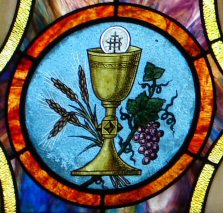 The Liturgy of the Eucharist
The Liturgy of the Eucharist
Gifts of bread and wine
symbolizing ourselves are presented to the priest who will offer them to God the
Father. Through the Holy Spirit, they will become the Body and Blood of
Jesus Christ whom we receive in Holy Communion. Jesus unites Himself with
us for our spiritual nourishment and strength. Today, when individuals do
not present their own personal offerings of bread and wine, the monetary contribution
symbolizes the material of their united sacrifice. The priest makes and
offering of the bread and wine to God.
Preparation of the Bread and
Wine:
Priest: Blessed are you, Lord, God of all creation, through your goodness we have
this bread to offer, which earth has given and human hands have made. It
will become for us the bread of life.
All:
Blessed be God for ever.
Priest: By
the mystery of this water and wine may we come to share in the divinity of
Christ, who humbled himself to share in our humanity.
Priest: Blessed are you, Lord God of all creation, for through your goodness we have
received the wine we offer you; fruit of the vine and work of human hands it
will become our spiritual drink.
All: Blessed be God for ever.
Priest: Lord
God, we ask you to receive us and be pleased with the sacrifice we offer you
with humble and contrite hearts.
The Priest's Hands are Washed: This
act was traditionally necessary because the priest handled the various gifts
presented by the people. Now, the cleansing act using water reminds the
priest and ourselves of the need to cleanse not only the hands but the soul.
Soon, the priest's hands will hold the actual body of Christ, and we will become
His dwelling place.
Priest: Lord,
wash away my iniquity; cleanse me from my sin. Pray, brethren, that
my sacrifice and yours may be acceptable to God, acceptable to God, the almighty Father.
All: May the Lord accept the sacrifice at your hands, for the praise and glory of his
name, for our good, and the good of all his holy Church.
Prayer over the Gifts:
Speaking in our name, the priest asks
the Father to accept the gifts we offer through him.
Priest: Hear us, almighty God,
and, having instilled in your servants the teachings of the Christian faith,
graciously purify them by the working of this sacrifice. Through Christ
our Lord.
All: Amen.
Eucharistic Prayer:
(Number Two: The priest may select from several forms).
Priest: The Lord be with you.
All: And
with your spirit.
Priest: Lift up your hearts.
All: We lift them up to the Lord.
Priest: Let us give thanks to the Lord, our God.
All: It is right to
give him thanks and praise.
Preface Prayer:
Priest: It is truly right and just, our duty and our salvation,
always and everywhere to give you thanks, Lord, holy Father, almighty and
eternal God, through Christ our Lord. For as true man he wept for Lazarus
his friend and as eternal God raised him from the tomb, just as, taking pity on
the human race, he leads us by sacred mysteries to new life. Through him
the host of Angels adores your majesty and rejoices in your presence for ever.
May our voices, we pray, join with theirs in one chorus of exultant praise, as
we acclaim:
Acclamation:
Priest
and All:
Holy, Holy, Holy Lord, God of power and might, Heaven and
earth are full of your glory. Hosanna in the
highest. Blessed
is he who comes
in the name of the Lord. Hosanna in the highest.
The priest repeats the words which
Christ used at his Last Supper when He changed the bread into His Body and the
wine into His Blood. His Body and Blood are truly present but under the
appearance of bread and wine. The death of Christ is prolonged in each of
those who receive Him worthily. We apply His death to ourselves so that we
may share His glory. This moment is the most solemn on earth because it is
Divine act which enables us to apply to ourselves the Cross which Christ
willingly took upon Himself.
We are called to die to sin and lift
our very selves to God so that we become changed; to do as God would have us do,
to become what God would
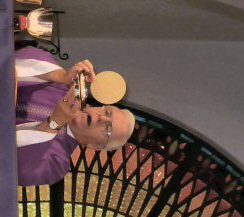 have
us become. Our own little cross can lift us into union with Christ's Cross
so we may earn the joys of everlasting happiness with God the Father.
have
us become. Our own little cross can lift us into union with Christ's Cross
so we may earn the joys of everlasting happiness with God the Father.
Priest: You are indeed Holy, O Lord, the fount of all holiness. Make holy,
therefore, these gifts, we pray, by sending down your spirit upon them like the
dewfall, so that they may become for us the Body and Blood of our Lord Jesus
Christ. At the time he was betrayed and entered willingly into his
Passion, he took bread and, giving thanks, broke it, and gave it to his
disciples, saying:
Take this, all of you, and eat of it, for this is
my Body, which will be given up for you.
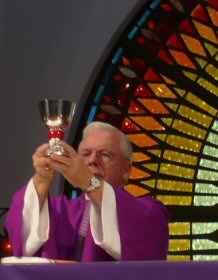 In a similar way, when supper was ended, he
took the chalice and, once more giving thanks, he gave it to his disciples,
saying:
In a similar way, when supper was ended, he
took the chalice and, once more giving thanks, he gave it to his disciples,
saying:
Take this, all of you, and drink from it, for
this is the chalice of my Blood, the Blood of the new and eternal covenant,
which will be poured out for you and for many for the forgiveness of sins.
Do this in memory of me.
Memorial Acclamation: (The priest may
select from several forms).
Priest: The
mystery of faith.
Priest
/ All: When we
eat this Bread and drink this Cup, we proclaim your Death, O Lord, until you
come again.
Memorial Prayer: (The
priest may select from several forms).
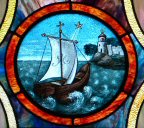 Therefore, as we celebrate the memorial of
his Death and Resurrection, we offer you, Lord, the Bread of life and the
Chalice of salvation, giving thanks that you have held us worthy to be in your
presence and minister to you. Humbly we pray that, partaking of the Body
and Blood of Christ, we may be gathered into one by the Holy Sprit.
Therefore, as we celebrate the memorial of
his Death and Resurrection, we offer you, Lord, the Bread of life and the
Chalice of salvation, giving thanks that you have held us worthy to be in your
presence and minister to you. Humbly we pray that, partaking of the Body
and Blood of Christ, we may be gathered into one by the Holy Sprit.
Remember, Lord, your Church, spread throughout the
world, and bring her to the fullness of charity, together with _____ our Pope
and _____ our Bishop and all the clergy. Remember also our brothers and
sisters who have fallen asleep in the hope of the resurrection, and all who have
died in your mercy: welcome them into the light of your face.
Have mercy on us all, we pray, that with the
Blessed Virgin Mary, Mother of God, with blessed Joseph, her Spouse, with the
blessed Apostles, and all the Saints who have pleased you throughout the ages,
we may merit to be coheirs to eternal life, and may praise and
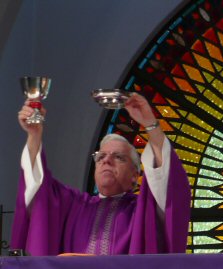 glorify you
through your Son, Jesus Christ.
glorify you
through your Son, Jesus Christ.
Doxology:
Prayer of Praise:
Through
him, with him, and in him, O God, almighty Father, in the unity of the Holy
Spirit, all glory and honor is yours, for ever and ever.
All: Amen.
Communion Rite
In the Liturgy of the Eucharist, we
symbolically offer ourselves to the Lord through the gifts of bread and wine.
At the Consecration, we offer our very lives to be united the God the Father
through the Cross of Christ. In Communion, we find that we have not died
at all, but have come to life. We have surrendered ourselves to God
through His Divine Son, Jesus Christ. In return become ennobled and
enriched. We give up time and we get eternity, we give up our sin and we
receive grace, we surrender our self-will and receive the strength of the Divine
Will, we give up ourselves and we receive everything. For the Son of God
says to us that unless we receive Him we shall not have Divine life in us.
But it is not really we who receive Christ as it is Christ who receives us,
bringing us into Himself.
God makes His Cross the very means
of our salvation and our life. While we have crucified Him, His eternal
love cannot be extinguished. Christ willed to give us the very life we
crucified in our Redemption, the Consecration of Holy Thursday into Communion,
His death into our everlasting life.
The Lord's
Prayer:
Priest: Let us pray for the coming of the kingdom as Jesus taught us.
Priest and
All: Our
Father, who art in heaven, hallowed be they name; Thy kingdom come; Thy will be
done on earth as it is in
heaven. Give us this
day our daily bread; and forgive us our trespasses as we forgive those who
trespass against us; and lead us not into temptation, but deliver us from evil.
Priest: Deliver us, Lord, from every evil, and grant us peace
in our day. In your mercy keep us free from sin and protect us from all
anxiety as we wait in joyful hope for the coming of our Savior, Jesus Christ.
All: For the
kingdom, the power and the glory are yours, now and for ever.
Prayer for
Peace:
Priest: Lord Jesus Christ, you said to your apostles,
peace I leave you, my peace I give you, look not on our sins, but on the faith
of your Church, and graciously grant the peace and unity of your kingdom where
you live for ever and ever.
All: Amen.
Priest: The peace of the Lord be with you always.
All: And with your spirit.
Priest: Let us offer each other the sign of peace.
Breaking of the Bread:
Priest and All: Lamb of God, you take away the sins of the
world, have mercy on us.
Lamb of God, you take away the sins of the world, have mercy on us.
Lamb of God, you take away the sins of the world, grant us peace.
Priest: May this mingling of
the Body and Blood of our Lord Jesus Christ bring eternal life to us who receive
it.
Communion of the Priest:
Priestly Preparation: May
the receiving of your Body and Blood, Lord Jesus Christ, not bring me to
judgment and condemnation, but through your loving mercy be for me protection in
mind and body and a healing remedy.
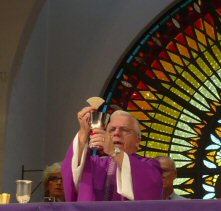 Priest: Behold
the Lamb of God who takes away the sins of the world. Happy are
those who are called to his supper.
Priest: Behold
the Lamb of God who takes away the sins of the world. Happy are
those who are called to his supper.
Priest and All: Lord,
I am not worthy to receive you, but only say the word and I shall be healed.
Priest: May the Body of Christ keep me safe for eternal life.
May the Blood of Christ keep me safe for eternal life.
Communion Antiphon:
Communion Song: John 11:26
Everyone who lives and believes in me will not die for ever, says the Lord.
Communion of the Faithful:
Priest:
The Body of Christ.
The Faithful: Amen.
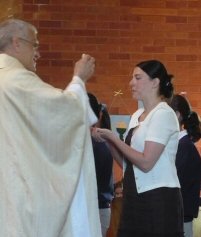
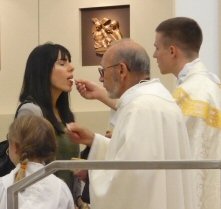
Priest:
The Blood of Christ.
The Faithful: Amen.
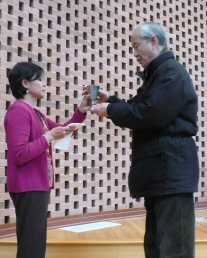
Cleansing of the Vessels:
Priest: Lord, may I receive these gifts in purity of heart.
May they bring me healing and strength, now and for ever.
Prayer after Communion:
Priest: Let us pray.
Priest: We
pray, almighty God, that we may always be counted among the members of Christ,
in whose Body and Blood we have communion. Who lives and reigns for ever
and ever.
Concluding Rite
Priest: The Lord be with you.
All: And also with you.
Priest: Bow your heads and let us pray for God's blessing.
Dismissal Prayer: (The priest may select
from several forms)
Priest:
Bless, O Lord, your people, who long for the gift of your mercy, and
grant what, at your prompting, they desire they may receive by your generous
gift. Through Christ our Lord.
All: Amen.
Final Blessing:
Priest: May almighty God bless you, the Father, and the Son, and
the Holy Spirit.
All: Amen.
Priest/Deacon: Go in peace,
glorifying the Lord by your life..
All: Thanks be to
God.
 O
my Jesus, forgive us our sins
O
my Jesus, forgive us our sins
Save us from the fires of hell.
Lead all souls to heaven,
Especially those in most need of your mercy.
www.Divinemasterplanforlife.com
www.Saintsnheaven.com
Top
Home Page
Liturgical Year Cycle
2019-2020

 The Gospel:
The Liturgy of the Word is completed
by the reading of the Gospel. Before its reading, the members of the
assembly trace the sign of the cross upon the forehead to indicate their mental
acceptance of the Truth, on the lips to indicate their readiness to announce it,
and over the heart to indicate their sincere desire to accept it into their
lives. The "Good News" of the Gospel tells that God's kingdom has come for
all to hear, accept, and announce to the world for its salvation. It
is God who is speaking to us. Christ comes to teach us by the example of
His life and by His own words.
The Gospel:
The Liturgy of the Word is completed
by the reading of the Gospel. Before its reading, the members of the
assembly trace the sign of the cross upon the forehead to indicate their mental
acceptance of the Truth, on the lips to indicate their readiness to announce it,
and over the heart to indicate their sincere desire to accept it into their
lives. The "Good News" of the Gospel tells that God's kingdom has come for
all to hear, accept, and announce to the world for its salvation. It
is God who is speaking to us. Christ comes to teach us by the example of
His life and by His own words. Now
a man was ill, Lazarus from Bethany, the village of Mary and her sister Martha.
Mary was the one who had anointed the Lord with perfumed oil and dried his feet
with her hair; it was her brother Lazarus who was ill. So the sisters sent word
to Jesus saying, “Master, the one you love is ill.” When Jesus heard this he
said, “This illness is not to end in death, but is for the glory of God, that
the Son of God may be glorified through it.” Now Jesus loved Martha and her
sister and Lazarus. So when he heard that he was ill, he remained for two days
in the place where he was. Then after this he said to his disciples, “Let us go
back to Judea.” The disciples said to him, “Rabbi, the Jews were just trying to
stone you, and you want to go back there?” Jesus answered, “Are there not
twelve hours in a day? If one walks during the day, he does not stumble,
because he sees the light of this world. But if one walks at night, he
stumbles, because the light is not in him.” He said this, and then told them,
“Our friend Lazarus is asleep, but I am going to awaken him.” So the disciples
said to him, “Master, if he is asleep, he will be saved.” But Jesus was talking
about his death, while they thought that he meant ordinary sleep. So then Jesus
said to them clearly, “Lazarus has died. And I am glad for you that I was not
there, that you may believe. Let us go to him.” So Thomas, called Didymus,
said to his fellow disciples, “Let us also go to die with him.”
Now
a man was ill, Lazarus from Bethany, the village of Mary and her sister Martha.
Mary was the one who had anointed the Lord with perfumed oil and dried his feet
with her hair; it was her brother Lazarus who was ill. So the sisters sent word
to Jesus saying, “Master, the one you love is ill.” When Jesus heard this he
said, “This illness is not to end in death, but is for the glory of God, that
the Son of God may be glorified through it.” Now Jesus loved Martha and her
sister and Lazarus. So when he heard that he was ill, he remained for two days
in the place where he was. Then after this he said to his disciples, “Let us go
back to Judea.” The disciples said to him, “Rabbi, the Jews were just trying to
stone you, and you want to go back there?” Jesus answered, “Are there not
twelve hours in a day? If one walks during the day, he does not stumble,
because he sees the light of this world. But if one walks at night, he
stumbles, because the light is not in him.” He said this, and then told them,
“Our friend Lazarus is asleep, but I am going to awaken him.” So the disciples
said to him, “Master, if he is asleep, he will be saved.” But Jesus was talking
about his death, while they thought that he meant ordinary sleep. So then Jesus
said to them clearly, “Lazarus has died. And I am glad for you that I was not
there, that you may believe. Let us go to him.” So Thomas, called Didymus,
said to his fellow disciples, “Let us also go to die with him.” The Liturgy of the Eucharist
The Liturgy of the Eucharist have
us become. Our own little cross can lift us into union with Christ's Cross
so we may earn the joys of everlasting happiness with God the Father.
have
us become. Our own little cross can lift us into union with Christ's Cross
so we may earn the joys of everlasting happiness with God the Father.
 In a similar way, when supper was ended, he
took the chalice and, once more giving thanks, he gave it to his disciples,
saying:
In a similar way, when supper was ended, he
took the chalice and, once more giving thanks, he gave it to his disciples,
saying: Therefore, as we celebrate the memorial of
his Death and Resurrection, we offer you, Lord, the Bread of life and the
Chalice of salvation, giving thanks that you have held us worthy to be in your
presence and minister to you. Humbly we pray that, partaking of the Body
and Blood of Christ, we may be gathered into one by the Holy Sprit.
Therefore, as we celebrate the memorial of
his Death and Resurrection, we offer you, Lord, the Bread of life and the
Chalice of salvation, giving thanks that you have held us worthy to be in your
presence and minister to you. Humbly we pray that, partaking of the Body
and Blood of Christ, we may be gathered into one by the Holy Sprit.  glorify you
through your Son, Jesus Christ.
glorify you
through your Son, Jesus Christ. Priest: Behold
the Lamb of God who takes away the sins of the world. Happy are
those who are called to his supper.
Priest: Behold
the Lamb of God who takes away the sins of the world. Happy are
those who are called to his supper. 


 O
my Jesus, forgive us our sins
O
my Jesus, forgive us our sins